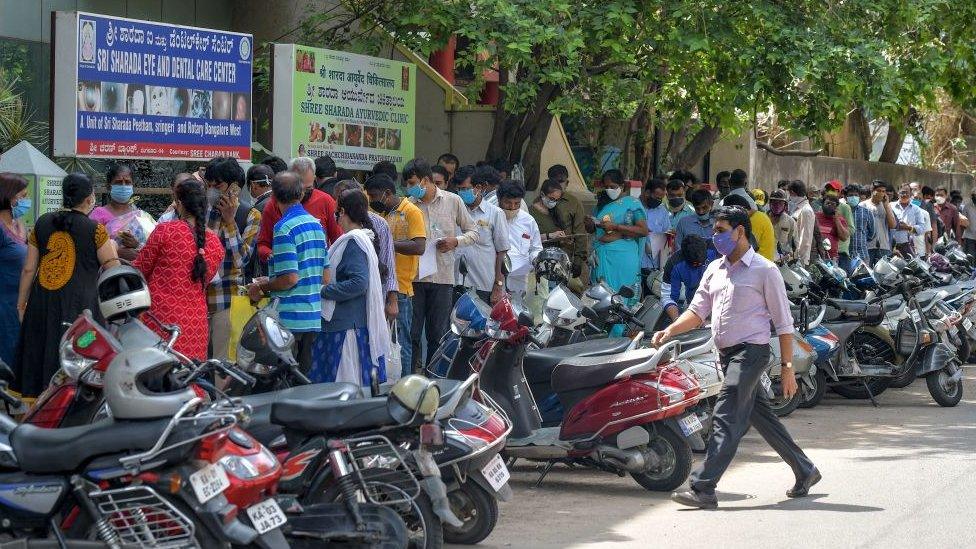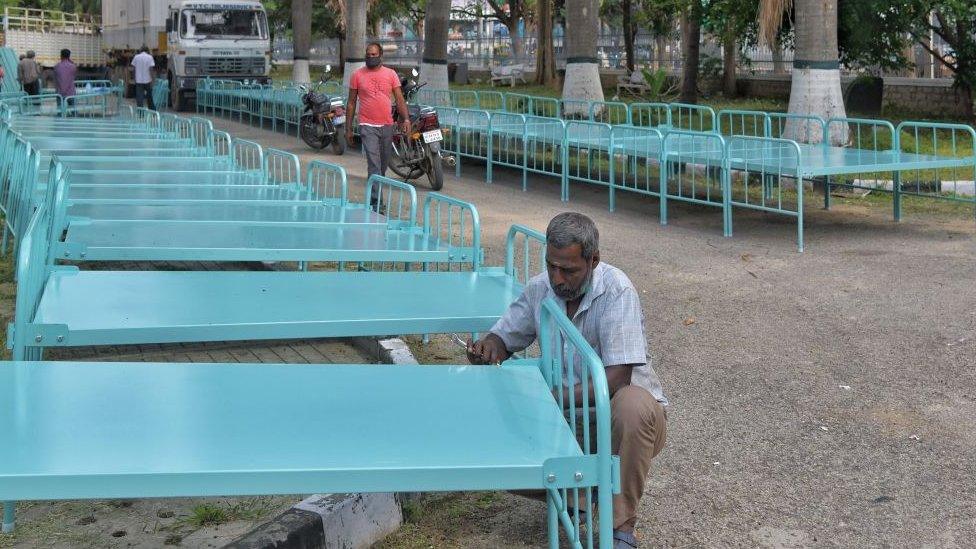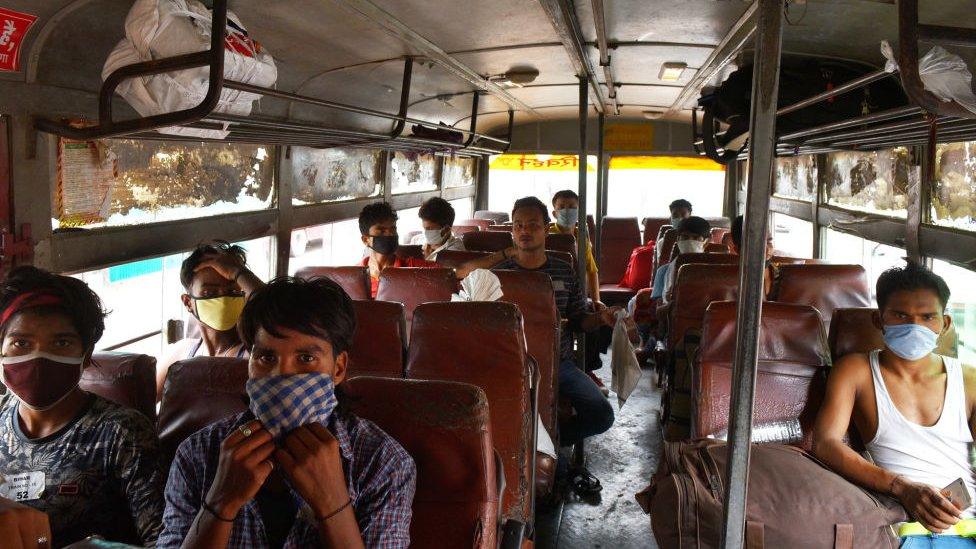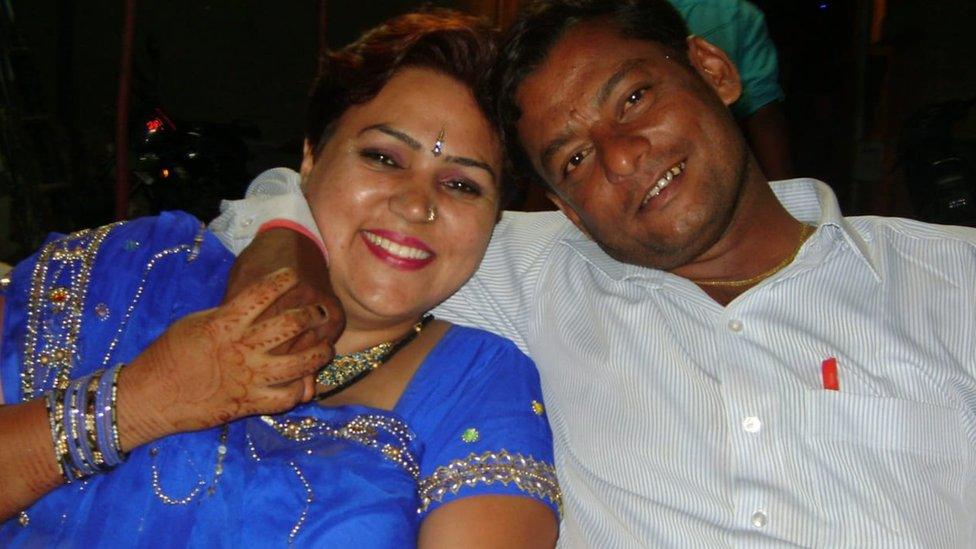India coronavirus: Questions over death of man 'turned away by 18 hospitals'
- Published
In India some suspected coronavirus patients are turned away from hospitals
Indian officials are investigating nine hospitals in the southern city of Bangalore, amid allegations that a man died after being refused treatment at all of them, writes BBC Hindi's Imran Qureshi.
Bhawarlal Sujani, 52, breathed his last at the doorstep of one of the many hospitals that had refused to admit him.
His brother, Dinesh Sujani, who had tried desperately to get him treated, broke down as he recalled the final hours of Bhawarlal's life.
The moment Bhawarlal began exhibiting what appeared to be Covid-19 symptoms, Dinesh rushed his brother on a scooter to Bhagwan Mahaveer Hospital, he said, 5km (3 miles) from their home.
"I told them his pulse has fallen, he is having breathing difficulties and he is vomiting," Dinesh said. "They took him inside, took an x-ray and then came out with something written in English on a paper and told me to please take him away from there."
The hospital denied that its staff refused Bhawarlal primary treatment.
Dinesh said he found an ambulance and took his brother to another hospital, only to be turned away again. The brothers spent futile hours trying, he said, moving from hospital to hospital without any luck.
Both private and government hospitals refused to treat his brother, Dinesh said. "They sent us away from the entrance itself."
Bhawarlal's young son, Vikram, told a local newspaper that the family "physically visited 18 hospitals and called up 32 others, crisscrossing the city for about 120km".
His father's story has become a sadly familiar tale in India. There have been numerous media reports of people with Covid-like symptoms dying after being refused treatment, often by several hospitals.
Karnataka state - of which Bangalore is the capital - has now issued an official notice asking at least nine hospitals, including one run by the state, to explain why they should not be prosecuted over Bhawarlal's death.

Hospitals say they are overwhelmed with patients
"Private medical establishments cannot deny/refuse/avoid treatment to patients with Covid-19 and Covid-19 symptoms," the state health commissioner, Pankaj Kumar Pandey, wrote in a statement.
But hospitals say they are overwhelmed. Dr Nishanth Hiremath, of Bhagwan Mahaveer, told the BBC the hospital had 45 beds reserved for coronavirus cases and all were occupied by patients at the time Bhawarlal was brought in.
Dr Hiremath denied allegations by the Sujani family that the hospital refused to treat Bhawarlal, saying staff gave him both oxygen and primary care.
"We also told them to get a swab test done wherever they got admitted. We advised them to go to a government hospital,'' he said.

Karnataka is trying to increase capacity for coronavirus cases
Part of the problem is a recent surge in Covid-19 cases in the state. Karnataka has been praised for its efforts in controlling the spread of the virus, especially in comparison to states like Delhi, Maharashtra or Tamil Nadu, which have become major hotspots.
But since India's stringent lockdown began to be eased towards the end of May, case numbers have been rising. On 8 June, the state had 308 confirmed cases and 64 deaths. On 1 July, it had recorded 1,272 cases and 253 deaths. In that same period, confirmed cases jumped from 18 to 732 in Bangalore alone.
State officials have have been racing to ramp up capacity. They have struck deals with private hospitals to free up more beds for Covid-19 patients in the coming days, officials said.
"The government will now have about 7,000 to 7,500 extra beds from the private sector. This means we can be in a state of readiness for the next one month or so," Dr MC Nagendra Swamy, the principal coordinator for the Federation of Healthcare Associations of Karnataka, told the BBC.
That would take the total capacity of the state - with a population of 64 million - to a little over 10,000 beds.

Cases have spiked in India in the weeks since the country reopened
But experts warn that the increase may not be adequate to meet demand once case numbers peak, which is expected in July to August.
"Once cases increase we need to prioritise who needs hospitalisation," said Dr Giridhar Babu, an epidemiologist at the Public Health Foundation of India and member of the state's panel of experts.
"Most of the middle class can stay at home if they are mildly symptomatic. Only those who do not have a separate room for home isolation should be admitted to the hospital," he said.
"Once a hotline is set up for all the Covid beds in the government and private sector, it will be possible for the control room to direct a patient to the hospital which has a bed available," he added. "Meaning the patient need not run from one hospital to another," Dr Swamy added.
- Published17 June 2020

- Published12 June 2020
